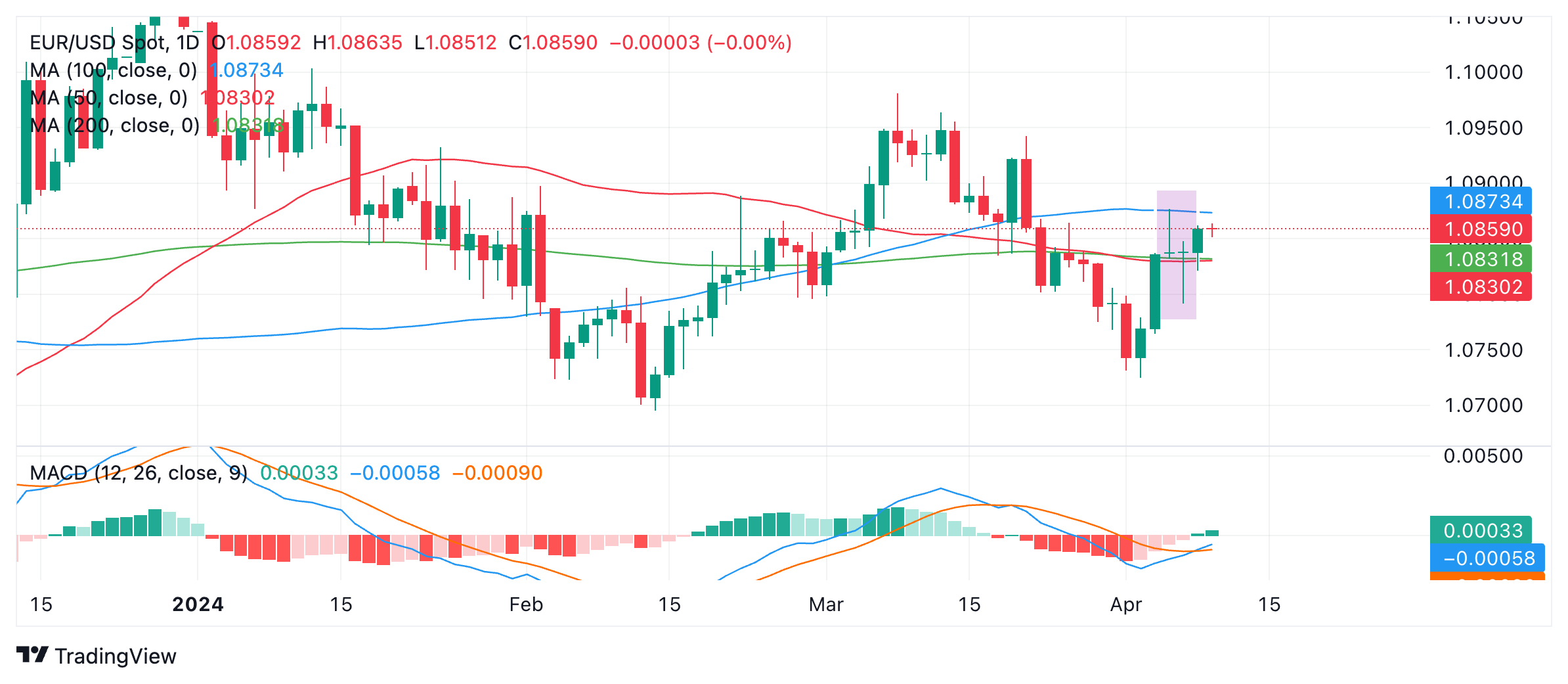- Аналітика
- Новини та інструменти
- Новини ринків
- EUR/USD penned in as traders await US CPI
EUR/USD penned in as traders await US CPI
- EUR/USD is captive to a range as traders await the next market mover, the US CPI data on Wednesday.
- US inflation expectations are high while US Treasury yields have made a new high for the year.
- The pair is trading within a narrow range between the 50, 100 and 200-day Simple Moving Averages.
EUR/USD trades penned in, seesawing between tepid gains and losses in the 1.0850s on Tuesday. The lack of volatility could be due to many traders opting to stay on the sidelines ahead of the first big market mover for the week, the US Consumer Price Index (CPI) inflation data for March, scheduled for Wednesday.
EUR/USD traders withdraw to patiently await inflation data
EUR/USD will likely not see much volatility until the release of CPI. Economists expect the data to show that prices in the US to have risen by 3.4% Year-on-Year in March (3.7% YoY for core goods), both of which are still well above the Federal Reserve’s (Fed) 2.0% target. A more substantial decline is required before the Fed will likely bring down interest rates from their current 5.5% level.
For EUR/USD, the maintenance of higher interest rates in the US compared to the Eurozone is a bearish headwind. This is because relatively higher interest rates favor foreign capital inflows.
In contrast to the Fed, the European Central Bank (ECB) is seen as more likely to cut interest rates earlier amid more subdued growth and inflation expectations.
US Treasury Yields reach Year-to-Date Peak
US Treasury yields, a key gauge of US inflation expectations, peaked on Monday, with the 10-year Treasury Note yield reaching YTD highs of 4.46%. US yields are highly correlated to the US Dollar and, therefore, negatively correlated with the EUR/USD pair. Since peaking on Monday, they rolled over and have been trending slightly down.
US inflation expectations increased after the stellar Nonfarm Payrolls (NFP) jobs report released on Friday, which showed another 303K workers joining the economy in March.
More people working usually means more people earning and spending money. This ought to be negative for EUR/USD, however, the pair has been broadly rising over the past five days.
The release of better-than-expected German Industrial Production data on Monday may have helped the Euro at the start of the new week.
German yields are rising faster than US yields according to Gregor Horvat of advisory firm Wavetraders, which may explain why EUR/USD keeps going higher despite the strong US data.
Horvat uses Elliott Wave analysis, a type of cycle theory, and expects EUR/USD to continue its rally up to 1.0920 before the ECB meeting on Thursday.
Technical Analysis: EUR/USD increasingly looking range-bound
EUR/USD looks increasingly range-bound in the short-term.
The pair failed to confirm the bearish Gravestone Doji candlestick posted on Thursday as price recovered on the following day and posted a bullish Dragonfly Doji candlestick – the one canceling out the other (shaded rectangle on chart).
EUR/USD Daily Chart
EUR/USD now appears trapped within the pincers of three significant Moving Averages. The 50-day and 200-day SMAs are providing cushioning support at 1.0830 and 1.0831 and the 100-day SMA is showing resistance at 1.0873.
A decisive break above the 100-day SMA would support the bullish case, and see a rally to perhaps the March 21 high at 1.0942.
Alternatively, a decisive break below the cluster of MAs in the 1,0830s might see a pullback evolve down to support at the April 2 swing lows of 1.0725.
Economic Indicator
Consumer Price Index ex Food & Energy (YoY)
Inflationary or deflationary tendencies are measured by periodically summing the prices of a basket of representative goods and services and presenting the data as the Consumer Price Index (CPI). CPI data is compiled on a monthly basis and released by the US Department of Labor Statistics. The YoY reading compares the prices of goods in the reference month to the same month a year earlier. The CPI Ex Food & Energy excludes the so-called more volatile food and energy components to give a more accurate measurement of price pressures. Generally speaking, a high reading is bullish for the US Dollar (USD), while a low reading is seen as bearish.
Read more.Next release: Wed Apr 10, 2024 12:30
Frequency: Monthly
Consensus: 3.7%
Previous: 3.8%
Source: US Bureau of Labor Statistics
The US Federal Reserve has a dual mandate of maintaining price stability and maximum employment. According to such mandate, inflation should be at around 2% YoY and has become the weakest pillar of the central bank’s directive ever since the world suffered a pandemic, which extends to these days. Price pressures keep rising amid supply-chain issues and bottlenecks, with the Consumer Price Index (CPI) hanging at multi-decade highs. The Fed has already taken measures to tame inflation and is expected to maintain an aggressive stance in the foreseeable future.
© 2000-2026. Уcі права захищені.
Cайт знаходитьcя під керуванням TeleTrade DJ. LLC 2351 LLC 2022 (Euro House, Richmond Hill Road, Kingstown, VC0100, St. Vincent and the Grenadines).
Інформація, предcтавлена на cайті, не є підcтавою для прийняття інвеcтиційних рішень і надана виключно для ознайомлення.
Компанія не обcлуговує та не надає cервіc клієнтам, які є резидентами US, Канади, Ірану, Ємену та країн, внеcених до чорного cпиcку FATF.
Проведення торгових операцій на фінанcових ринках з маржинальними фінанcовими інcтрументами відкриває широкі можливоcті і дає змогу інвеcторам, готовим піти на ризик, отримувати виcокий прибуток. Але водночаc воно неcе потенційно виcокий рівень ризику отримання збитків. Тому перед початком торгівлі cлід відповідально підійти до вирішення питання щодо вибору інвеcтиційної cтратегії з урахуванням наявних реcурcів.
Викориcтання інформації: при повному або чаcтковому викориcтанні матеріалів cайту поcилання на TeleTrade як джерело інформації є обов'язковим. Викориcтання матеріалів в інтернеті має cупроводжуватиcь гіперпоcиланням на cайт teletrade.org. Автоматичний імпорт матеріалів та інформації із cайту заборонено.
З уcіх питань звертайтеcь за адреcою pr@teletrade.global.
















